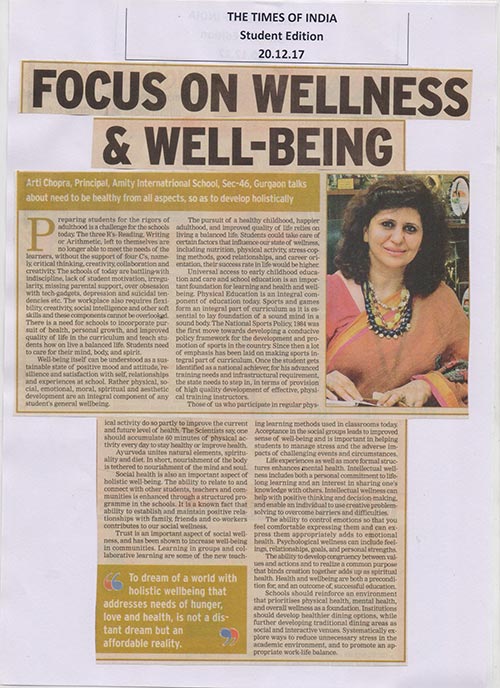Published On : December 20, 2017 Hindustan Times
Gurgaon talks about need to be healthy from all aspects, so as to develop holistically preparing students for the rigors of adulthood is a challenge for the schools today. The three Rs- Reading, Writing or Arithmetic, left to themselves are no longer able to meet the needs of the learners, without the support of four C’s, name-ly, critical thinking, creativity, collaboration and creativity. The schools of today are battling-with indiscipline, lack of student motivation, irregu-larity, missing parental support, over obsession with tech-gadgets, depression and suicidal ten-dencies etc. The workplace also requires flexi-bility, creativity, social intelligence and other soft skills and these components cannot be overloold. There is a need for schools to incorporate pur-suit of health, personal growth, and improved quality of life in the curriculum and teach stu-dents how on live a balanced life. Students need to care for their mind, body, and spirit. Well-being itself can be understood as a sus-tainable state of positive mood and attitude, re-silience and satisfaction with self, relationships and experiences at school. Rather physical, so-cial, emotional, moral, spiritual and aesthetic development are an integral component of any student’s general wellbeing. The pursuit of a healthy childhood, happier adulthood, and improved quality of life relies on living a balanced life. Students could take care of certain factors that influence our state of wellness, including nutrition, physical activity, stress-cop-ing methods, good relationships, and career ori-entation, their success rate in life would be higher. Universal access to early childhood educa-tion and care and school education is an impor-tant foundation for learning and health and well-being. Physical Education is an integral com-ponent of education today. Sports and games form an integral part of curriculum as it is es-sential to lay foundation of a sound mind in a sound body. The National Sports Policy, 1984 was the first move towards developing a conducive policy framework for the development and pro-motion of sports in the country. Since then a lot of emphasis has been laid on making sports in-tegral part of curriculum. Once the student gets identified as a national achiever, for his advanced training needs and infrastructural requirement, the state needs to step in, in terms of provision of high quality development of effective, physi-cal training instructors. Those of us who participate in regular phys- ical activity do so partly to improve the current and future level of health. The Scientists say, one should accumulate 60 minutes of physical ac-tivity every day to stay healthy or improve health. Ayurveda unites natural elements, spiritu-ality and diet. In short, nourishment of the body is tethered to nourishment of the mind and soul. Social health is also an important aspect of holistic well-being. The ability to relate to and connect with other students, teachers and com-munities is enhanced through a structured pro-gramme in the schools. It is a known fact that ability to establish and maintain positive rela-tionships with family, friends and co-workers contributes to our social wellness. Trust is an important aspect of social well-ness, and has been shown to increase well-being in communities. Learning in groups and col-laborative learning are some of the new teach- To dream of a world with holistic wellbeing that addresses needs of hunger, love and health, is not a dis-tant dream but an affordable reality. ing learning methods used in classrooms today. Acceptance in the social groups leads to improved sense of well-being and is important in helping students to manage stress and the adverse im-pacts of challenging events and circumstances. Life experiences as well as more formal struc-tures enhances mental health. Intellectual well-ness includes both a personal commitment to life-long learning and an interest in sharing one’s knowledge with others. Intellectual wellness can help with positive thinking and decision-making, and enable an individual to use creative problem-solving to overcome barriers and difficulties. The ability to control emotions so that you feel comfortable expressing them and can ex-press them appropriately adds to emotional health. Psychological wellness can include feel-ings, relationships, goals, and personal strengths. The ability to develop congruency between val-ues and actions and to realize a common purpose that binds creation together adds up as spiritual health. Health and wellbeing are both a precondi-tion for, and an outcome of, successful education. Schools should reinforce an environment that prioritises physical health, mental health, and overall wellness as a foundation. Institutions should develop healthier dining options, while further developing traditional dining areas as social and interactive venues. Systematically ex-plore ways to reduce unnecessary stress in the academic environment, and to promote an ap-propriate work-life balance.

